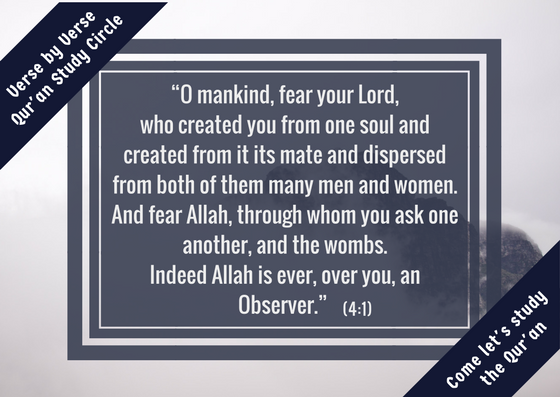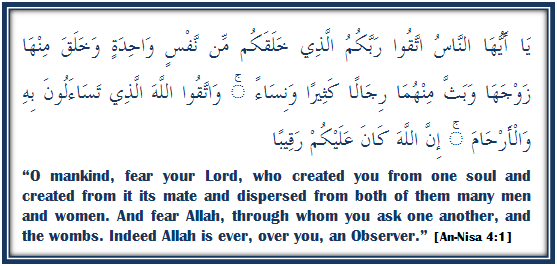Tafseer Surah An-Nisa Ayah 1
Allah subhanahu wa ta’ala begins Surah an-Nisa by commanding His servants to have Taqwa of Him. He reminds us of His might, for He created many human beings from one soul – Prophet Adam ‘alayhi salaam.
Mufti Muhammad Shafi Usmani explains the word ittaqu [اتَّقُوا] translated here as fear means “to have fear of acting against your Lord.” Perhaps, this is why the Prophet salAllahu ‘alayhi wa sallam used to recite this ayah as part of his address while solemnizing a marriage.
[Prophet Muhammad’s Sermon on Marriage]
Here, the form of address in the ayah is worth attention. It says “O mankind” which includes all human beings, men or women, and whether they are present at the time of the revelation of the Qur’an or shall continue to be born right till the Day of Resurrection.
Then along with the word ittaqu the word used is “Rabb” (Lord) which has been selected out of the most fair Names of Allah subhanahu wa ta’ala. This is to point out that the fear of Allah has a justification and wisdom of its own. The Being responsible for man’s nurturing and upbringing deserves all the awe one is capable of. The thought that anyone could rise in antagonism and defiance against Allah is dangerous.
Immediately after, the text brings into focus the most exalted majesty of the Lord by saying that He created all human beings in His wisdom and mercy.
He chose to have one way and one form when he created all human beings from the one and only human being that is Adam ‘alayhi sallam and thus He tied all of them in a strong bond of brotherhood. It is not only the fear of Allah and the fear of Akhirah [the Hereafter], which demand man’s allegiance to the Lord of all creation, but this bond of brotherhood between human beings also requires that rights of humanity – of mutual sympathy, well-being and collective good – be fully discharged. Between one man and another, let there be no one high or low in the race of cast, in color or language, and all such distinctions be never made the criterion of good or bad, nobility or meanness.
Therefore, it was said,
الَّذِي خَلَقَكُم مِّن نَّفْسٍ وَاحِدَةٍ وَخَلَقَ مِنْهَا زَوْجَهَا وَبَثَّ مِنْهُمَا رِجَالًا كَثِيرًا وَنِسَاءً ۚ
“…who created you from one soul and created from it its mate and dispersed from both of them many men and women.”
Ibn Katheer explains, “…and created from it its mate…” it refers to the Hawwa’ [Eve] ‘alayhi salaam who was created from Prophet Adam’s left rib, from his back while he was sleeping. When he woke up and saw Hawwa’, he liked her and had affection for her, and she felt the same toward him.
An authentic hadeeth states,
إِنَّ الْمَرْأَةَ خُلِقَتْ مِنْ ضِلَعٍ، وَإِنَّ أَعْوَجَ شَيْءٍ فِي الضِّلَعِ أَعْلَاهُ، فَإِنْ ذَهَبْتَ تُقِيمُهُ كَسَرْتَهُ، وَإِنِ اسْتَمْتَعْتَ بِهَا اسْتَمْتَعْتَ بِهَا وَفِيهَا عِوَج
“Woman was created from a rib. Verily, the most curved portion of the rib is its upper part, so, if you should try to straighten it, you will break it, but if you leave it as it is, it will remain crooked.”
Mufti Muhammad Shafi Usmani comments this ayah serves as an introduction to commandments, which are going to appear in the Surah. The purpose here is to dissuade human beings from becoming the usurpers of Divine rights. By telling that they all are the children of the same father, the wonderful humane dimension of love, mutual sympathy and concern were given as the working hypothesis of common living. This was done so that the mutual rights of relatives, orphans and married couples could be fulfilled right from the heart at the grass-root level.
Allah subhanahu wa ta’ala says,
وَاتَّقُوا اللَّهَ الَّذِي تَسَاءَلُونَ بِهِ وَالْأَرْحَامَ ۚ
“And fear Allah, through whom you ask one another, and the wombs…”
It means to protect yourself from the punishment of Allah subhanahu wa ta’ala by your acts of obedience to Him. His statement, “through whom you ask one another…” is in reference to when some people say, “I ask you by Allah,” or “for the sake of Allah, please do this.” Often in Pakistan, street beggars say, “In the Name of Allah please help me.” The ayah refers to that.
Ad-Dahhak said it means, “Fear Allah Whom you invoke when you conduct transactions and contracts.”
The ayah also suggests reverence of the womb by not cutting the relations of the womb, but maintaining and honoring them.
Allah subhanahu wa ta’ala says,
إِنَّ اللَّهَ كَانَ عَلَيْكُمْ رَقِيبًا
“Indeed Allah is ever, over you, an Observer.”
It means He watches all our deeds and sees our every circumstance. He is Witness over all things.
An authentic hadeeth states,
اعْبُدِاللهَ كَأَنَّكَ تَرَاهُ، فَإِنْ لَمْ تَكُنْ تَرَاهُ،فَإِنَّهُ يَرَاك
“Worship Allah as if you see Him, for even though you cannot see Him, He sees you.”
Ibn Katheer writes this part of the ayah encourages having a sense of certainty that Allah subhanahu wa ta’ala is always watching us. Allah subhanahu wa ta’ala mentioned that He has created mankind from a single father and a single mother so that they feel compassion for each other and are kind to the weaker among them.
In his Saheeh, Muslim recorded that Jareer bin ‘Abdullah Al-Bajali said that a delegation from Mudar came to the Messenger of Allah salAllahu ‘alayhi wa sallam, and he saw their state, wearing striped woolen clothes due to poverty. After the Zuhr prayer, the Messenger of Allah salAllahu ‘alayhi wa sallam stood up and gave a speech in which he recited,
يَٰـأَيُّهَا النَّاسُ اتَّقُواْ رَبَّكُمُ الَّذِى خَلَقَكُمْ مِّن نَّفْسٍ وَٰحِدَةٍ
“O mankind, fear your Lord, Who created you from one soul…” until the end of the ayah. He also recited,
يٰأَيُّهَا الَّذِينَ ءَامَنُواْ اتَّقُواْ اللَّهَ وَلْتَنظُرْ نَفْسٌ مَّا قَدَّمَتْ لِغَدٍ
“O you who have believed, fear Allah . And let every soul look to what it has put forth for tomorrow…”
[Al-Hashr 59:18]
The Prophet salAllahu ‘alayhi wa sallam encouraged them to give charity, saying,
تَصَدَّقَ رَجُلٌ مِنْ دِينَارِهِ، مِنْ دِرْهَمِهِ، مِنْ صَاعِ بُرِّهِ، مِنْ صَاعِ تَمْرِه
“A man gave Sadaqah from his Dinar, from his Dirham, from his Sa’ of wheat, from his Sa’ of dates” until the end of the hadeeth. This narration was also collected by Ahmad and the Sunan compilers from Ibn Mas’oud radhiAllahu ‘anhu.
Lessons:
-
By telling us that we have been created from one soul, Allah subhanahu wa ta’ala reminds us to treat everyone as we wish to be treated. We are all from the same person.
-
This ayah teaches us equality
-
We learn that we can ask people by the name of Allah, for example, “For the sake of Allah, please do this for me.”
-
We learn that Taqwa is the key to success in this world and the Hereafter. Maintaining ties with people is difficult but when one remembers for Whose sake he is doing it, this test becomes easy. Give rights to other people because Allah subhanahu wa ta’ala commands you to do so. Do not be a cause of grief for others.
DOWNLOAD PDF: Tafseer Surah An-Nisa Ayah 1
رَبَّنَا تَقَبَّلْ مِنَّا ۖ إِنَّكَ أَنتَ السَّمِيعُ الْعَلِيم
“Our Lord, accept [this] from us. Indeed You are the All-Hearing, the All-Knowing.”
[Al-Baqarah 2: 127]


I really like your explanations and the way you have everything laid out. It is very easy to understand.
Jasak Allah Khair Akhi.
Alhumdulillah. All guidance is from Allah subhanahu wa ta’ala, may He allow us to be consistent with this project, ameen.